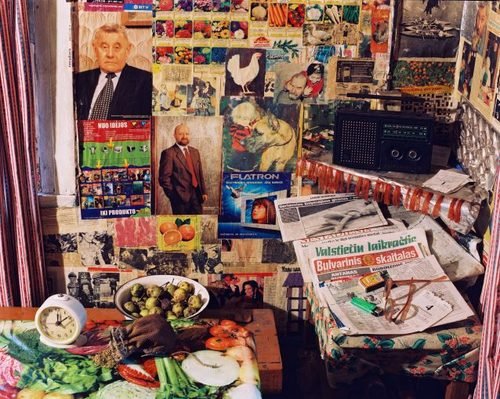There once was...
dal 23/5/2007 al 13/7/2007
Segnalato da
23/5/2007
There once was...
Giedre Bartelt Galerie, Berlin
Young Lithuanian Photographers. Vol. 2: Ramune Pigagaite and Arturas Valiauga. They influence new developments in photography and are inspiration to the next generation of more younger photographers.

Ramune Pigagaite and Arturas Valiauga
Ramune Pigagaite and Arturas Valiauga are two of the most remarkable
Lithuanian photographers, they influence new developments in
photography and are inspiration to the next generation of more younger
photographers.
Ramune Pigagaite has been living in Germany since 1992 where
she studied Photography. She concentrates on character portraits via
her own personal identity. Artist returns to Varena, her native town in the south
of Lithuania, to carry out her projects. Since 2000
Pigagaite has been working on a cycle People of my town. She
takes photos of various people in the open air before the same white
wall of the local food market. Their professions seem strange,
antiquated and curios: poet, beekeeper, rat-catcher etc. In Pigagaite`s
comparatively small-sized color photographs (a mere 35 by 23
centimeters in size) professional attributes are like theatrical
costumes that put a man into a certain fixed role. The characters look
funny because their `untouched` faces have nothing in common with the
roles their attributes so vividly declare. This is an ethnographic
glimpse that collects features characteristic to a certain region.
People that stand before her camera are mere`representatives`(of
profession, region); they do not have their history that would enable
us to imagine them as real persons.
In
the middle of the 1990s Arturas Valiauga got famous for his
fantastic fashion photographs. Maybe this estrangement from reality
that is so characteristic to advertising rekindled his interest in
photography with a sharp odor of reality. `The Talks with Stepas`
unfold as one looks at the walls of an old country house papered with
magazine and newspaper clippings. Here one can find `the entire life`:
from a hen (of course, the image of it), and Lithuanian "Peasants
Newspaper" to a well-known professor of history philosophizing on a TV
screen. A few`real`things and people merge into this medley and turn
into images.
The space in the photos of his cycle is radically flat -
the surface of walls papered with various clippings goes almost even
with the surface of a photo, and spaces that open up in the doors are
nothing more than another framed image. The space plane is disturbed
only by a random shadow, which is surreally discrepant and opens
strange voids. Time composed of read or leafed through magazines stands
frozen in fragments of past. Therefore in Valiauga`s cycle the
photographic narrative (shadows, light, expressions, moment) about a
man is replaced by a narrative of found images, only the assemblage is
also found, not made by author.
Opening on Thursday, May 24th
Giedre Bartelt Gallery
Linienstrasse 161- Berlin
Free admission



